Photographs: Jewella C Miranda/Rediff.com Rashmi Menon, Careers360
The apparel oft proclaims the man, said William Shakespeare.
In the 16th century Shakespearean era, clothes were given much thought and importance.
Five centuries later, not much has changed.
Dressing aptly for an interview or work can be mastered with attentiveness and care. The result seldom goes unnoticed.
The following tips will help you accentuate your performance at work.
Please click NEXT to continue reading...
1. Company culture sets the tone
Photographs: Rediff Archives
While torn jeans were considered a style statement in college, it's a disaster to don them for your interview, even though different sectors and companies have varying perceptions on dress codes.
Some have a written policy, while others follow unspoken norms.
Hence, carefully selecting an outfit for an interview is the sensible thing to do.
Formals are the preferred choice in corporate companies, while in other sectors the dress code can vary from semi-casual to downright casual.
In the case of Hector Beverages, which markets an energy drink, a suit and tie is considered to be overdressed for an interview.
"It depends on the DNA of the company. When we recruit candidates from colleges, we stress on wearing something comfortable but at the same time smart," reveals HR manager Ujwala Misra.
An advertising, design or social media agency may tolerate creative professionals coming even in shorts!
2. Sending subtle messages
Photographs: Uday Kuckian/Rediff.com
Attending an interview in neat, formal or semi-formal attire (depending on the sector), can subtly communicate an attentiveness towards work.
Some veterans in the corporate world feel that it can convey a level of seriousness and discipline, while informal attire can come across as having a casual attitude.
Smriti Singh, HR Head of Candid Marketing, Delhi, feels that a formal shirt with jeans or a knee-length formal skirt is a safe attire when going for interviews.
But if you are in doubt, call the HR of the company about what are acceptable standards before the interview date, she suggests.
"These days you get lots of trendy office wear. Freshers should start working on their wardrobes and invest in casuals that could be worn in office. No college casuals," advises Vidya Bhat, who works in a BPO in Bangalore.
Take your time building up the wardrobe gradually.
3. Attention to detail
Photographs: Uday Kuckian/Rediff.com
"While people who ask the technical questions may not notice what you are wearing during the interview, the HR personnel will observe how you are dressed, among other things," shares Kolkata-based lawyer Rukmini Das, who learnt this the hard way.
During her search for her first job, she recalls that even though the interview went well, she was not selected.
Her friends and seniors felt this was because she looked a little to plain and should have applied a little makeup to look presentable.
On a regular day, Rukumini sports trousers, a shirt and closed toe shoes, or formal-looking salwar-kameez with sandals.
4. Avoid overdressing
Photographs: Uday Kuckian/Rediff.com
Divya Renjan, a senior public relations consultant from Bangalore, says that a candidate once arrived for the interview with too much makeup on.
That candidate was not called again.
Moral of the story is that since an interviewer may see you only once before making up his or her mind, creating a good impression is of the utmost importance.
It's safer to skip loud colours and too much makeup, especially when you are a fresher.
5. Western vs Indian
Photographs: Sanjay Sawant/Rediff.com
Many corporate companies in India are flexible in their formal attire and do not insist on employees wearing suits, trousers and shirts or formal skirts.
However, if you are comfortable in Indian formals, who's to say no? Women can opt for a salwar-kameez or churidaars, or go for an Indo-western look with a fitted kurta and jeans. The latter applies to men too.
Ethnic dressing is preferred in non-profit organisations, where you may mingle with underserved communities.
Although, there is no restrictions on wearing Western formals, men are usually clad in half-sleeved shirts and pants or tee-shirts and jeans.
Women choose to wear saris, salwar suits, kurtas, leggings, tee-shirts and jeans in the office.
During field visits, it's always salwar suits, states Arthur Thangaiah, Chairman and CEO, Sahaara Charitable Society.
6. Pay attention to personal hygiene
Photographs: Chris Hondros/Getty Images
This factor could prove to be the deal breaker for some interviews, if the next candidate is as smart as you.
Mohan Ramnath, HR manager of IOS Relocations in Mumbai, says he takes note of small things like body odour and bad breath.
"Business may be gained or lost based on such things as the odour of smoking or onions and garlic breath. Foreign clients tend to abhor a foul odour from the mouth or body, or even a stale odour emanating from excessive use of hair oil," Ramnath explains.
Echoing a similar opinion, Smriti Singh narrates how she rejected a candidate whose shirt gave an impression that it had not been washed for days.
"If the overall appearance is proper, we don't place much importance on whether the shoes are matching the trousers," rounds up Mohan.
7. Accessories must blend with your attire
Photographs: Rajesh Karkera/Rediff.com
Corporate etiquette trainer Nishant Singh Tanwar of Hero Mindmine Institute offers some tips:
- Choose fabrics according to the weather, so that you look appropriate but are also comfortable
- Accessories must blend with your attire, not stand out like sore thumbs.
- Go for mild, subtle fragrances. The same goes for hair oil.
- Men are advised to shave daily.
- Use deodorant and mouth fresheners to keep odours at bay.
- No pointed heels in the office. They can prove to be an irritant to colleagues.
- No striped shirts with striped trousers/skirts or checked shirts with checked trousers/skirts. Ties should contrast with shirts, but complement attire. The same goes for socks.
8. Develop your own style
Photographs: Sanjay Sawant/Rediff.com
In his younger days as a medical representative, Vikram Tanver recalls wearing cotton, light-coloured formals, which were comfortable.
After working in varied sectors since, this corporate communications manager in Mumbai says it takes a little while to adapt your office dress code to your own taste.
Must-have wardrobe essentials for women professionals
Photographs: Uday Kuckian/Rediff.com
- Full sleeves/short-sleeved formal shirt: Two
- Formal pants/trousers/skirts: One (black or grey)
- Business suit: One (black)
- Formal cotton salwar kameez: Two to three
- Formal churidaar kurta: Two
- Leggings for kurtas: Two (one black and one white)
- Closed/open toe leather sandals: One
- Casuals: Kurti (three to four) and jeans (two), skirt (one), cargo pants (loosely cut pants with several pockets) (one), heels (one), informal sandals or shoes (one)
Wardobe essentials for male professionals
Photographs: Uday Kuckian/Rediff.com
- Full sleeves formal shirt: Two (white or soft colours)
- Half sleeves formal shirt: Two (white and soft colours
- Formal pants/trousers: Two (black and grey)
- Leather shoes: One (black or brown)
- Casuals: Collared casual shirts (two or three), jeans (two), cargo pants (one), loafers (slip-on shoes without laces)/floaters/sports shoes (one)


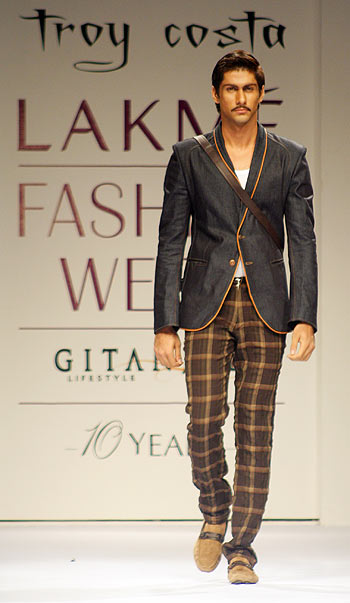
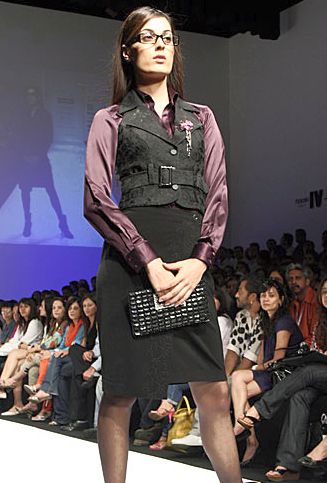
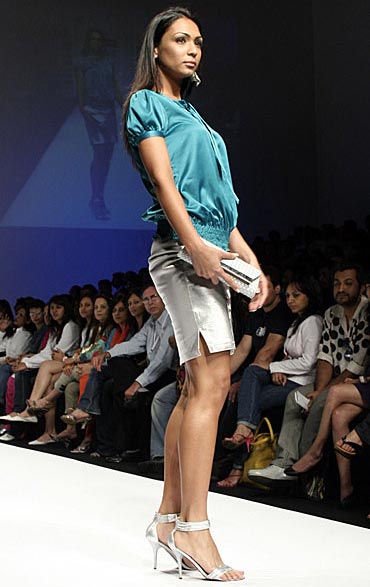
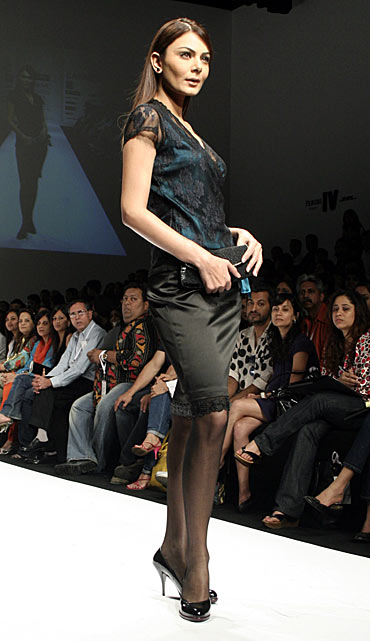
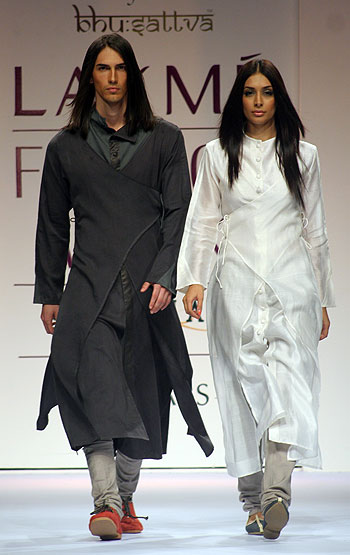


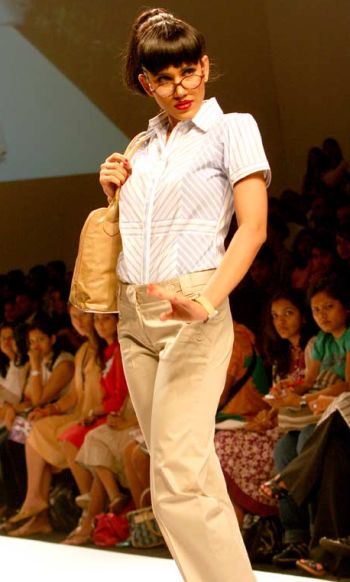
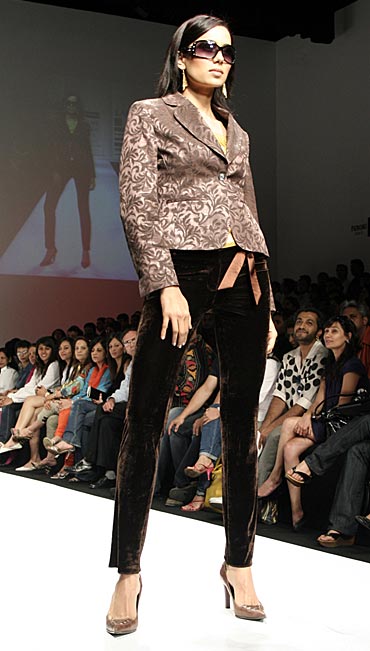
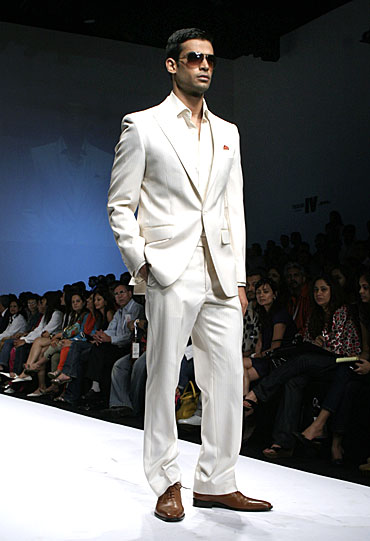
Comment
article